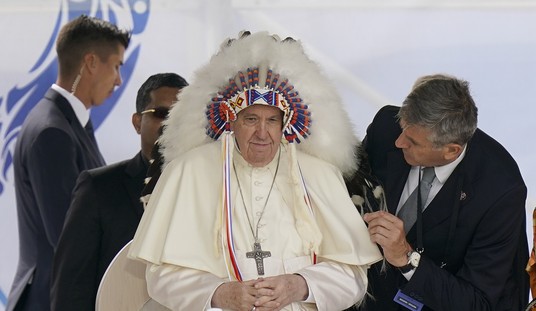Is this a new “high-stakes game of chicken,” as CBS News calls it, or just another round of the same game of Risk? North Korea staged live-fire military drills on its east coast today as the USS Carl Vinson task group made its long-awaited appearance in the Yellow Sea, and the nuclear sub USS Michigan arrived in Busan. So far, though, there have not been any further nuclear or missile tests:
N. Korea conducted a huge live-fire military drill this morning, part of a birthday celebration for their military https://t.co/ntjHfF5qaj pic.twitter.com/xIYGrUWwQR
— CBS This Morning (@CBSThisMorning) April 25, 2017
Trump is working the diplomatic channels too, demanding more action from the UN Security Council:
The “status quo” on North Korea is “unacceptable,” Mr. Trump told members of the United Nations Security Council on Monday at the White House. He scolded the other members of the council for falling short in their dealings with North Korea.
“The council must be prepared to impose additional and stronger sanctions,” he said. …
…[T]he Trump administration is ramping up diplomatic efforts to put pressure on North Korea. Mr. Trump has spoken by phone to the leaders of China and Japan.
On Wednesday, U.S. Senators will get a rare briefing on the issue at the White House, and on Friday, Secretary of State Rex Tillerson will chair a special meeting on North Korea at the United Nations.
Reuters points out the unusual nature of this comprehensive Senate briefing. It’s meant to send a signal that’s this is no longer the same old game, at least not in the Trump administration:
All 100 senators have been asked to the White House for the briefing by Secretary of State Rex Tillerson, Secretary of Defense Jim Mattis, Director of National Intelligence Dan Coats and General Joseph Dunford, chairman of the Joint Chiefs of Staff, said White House spokesman Sean Spicer on Monday.
While administration officials routinely travel to Capitol Hill to address members of Congress on foreign policy matters, it is unusual for the entire Senate to go to the White House, and for all four of those officials to be involved. …
Congressional aides suggested the briefing was being held at the White House to underscore the message to North Korea that Washington is serious about wanting a shift in policy.
However, the White House itself poured a little cold water on signaling:
A senior Trump administration official said the flurry of activity around North Korea was “not a part of something choreographed” and cautioned against over-interpretation.
Maybe … maybe not. Domestically, the White House would probably prefer to downplay the potential ramifications of the new, aggressive policy that dispenses with the “strategic patience” of the previous two decades or more. However, China’s leaders understand nuance, and they understand the lack of it. Parking a nuclear missile submarine in Busan is not nuanced, and neither is the THAAD system we’re expediting in South Korea. Calling the entire Senate to the White House for an urgent briefing is only slightly more nuanced. These signals may not be acknowledged by Pyongyang, but you can bet they’re getting heard loud and clear in Beijing, even as Trump continues to use diplomatic channels in parallel.
The problem for China is determining when enough is enough, and when it becomes less costly to deal with the after-effects of a coup in Pyongyang than to have US nuclear and anti-missile forces surround the Korean Peninsula. Georgetown analyst Matthew Kroenig lays out that calculation in this interview with CBSN (embed not available), and suggests that the tipping point on their strategic patience may be shortly at hand. That’s what happens in high-stakes games of chicken, eventually — or mutual destruction.








Join the conversation as a VIP Member